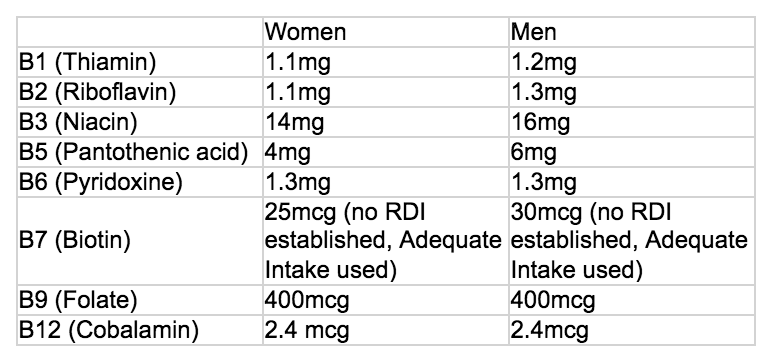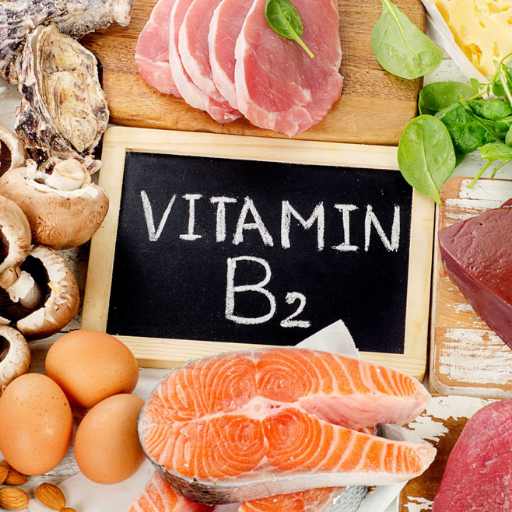Everything you need to know about B complex vitamins


Everything you need to know about B complex vitamins
Vitamins and minerals are naturally found in food and play a vital role in the body. There are 13 essential vitamins and 8 of these are B-vitamins. B complex vitamins are essential for the metabolism of energy. They help convert the fuel we consume in our diet, into energy that we can use to function each day.
Each B vitamin has a different role in the body. To find out whether you should be supplementing, how much you should be having and why these nutrients are important for you, keep reading.
What are B-complex vitamins?
Each B-vitamin is essential for the body's overall function. They each have different benefits from energy production, blood detoxification, creating DNA, metabolism, brain function and mood. B complex vitamins usually contain all the 8 B vitamins in one pill.
Vitable B-Complex supplement
Vitable offers a B-Complex supplement and it includes the following B vitamins:
- B1 – Thiamin:
Thiamin is essential for metabolism and converting foods into energy (1). - B2 – Riboflavin:
Riboflavin is an important antioxidant and it helps break down carbohydrates, fats and protein into energy (2). - B3 – Niacin: Niacin is involved in metabolism, producing oxygen and repairing DNA (3).
- B4 - Pantothenic Acid: Pantothenic acid helps convert carbohydrates, fats and protein into energy. It also helps produce fatty acids, which have a variety of roles within the body (5).
- B6 – Pyridoxine: Pyridoxine helps the body create new red blood cells. This is important for the delivery of oxygen to body cells and maintaining a healthy immune system (6).
- B7 – Biotin: Biotin is important for healthy nerve cells, and is beneficial for the health of your nails and hair (7).
- B9 – Folate: Folate or Folic acid - the form found in food, helps to create DNA and genetic material. In this regard, it may be beneficial for pregnant women as it may reduce the risk of birth defects (8).
- B12 - Cobalamin: Vitamin B12 is important for normal blood and brain function. It also plays a role in DNA synthesis (9).
How much vitamin B do you need?
Each of the 8 B-vitamins has a specific dose. These change based on age, gender, pregnancy and breastfeeding. Older adults often require a higher dose, whereas children require less. Some medical conditions may also cause poor absorption of B-vitamins, as well as increased losses through faeces and urine.
For healthy women and men between the ages of 18 and 50, the recommended dietary intake (RDI) for B-vitamins each day are as follows:

Who is at risk of vitamin B deficiency?
Most people can meet their B-vitamin needs by eating a balanced diet. However, certain medical conditions, medications and some dietary patterns can increase the risk of deficiency:
- Vegan and vegetarian diets limit animal products from their diet. As a result, people following these types of diets may be at risk of developing vitamin B12 deficiency unless fortified food or vitamin supplementation are considered (9)
- Human Immunodeficiency Virus (HIV) (10)
- Celiac disease (11)
- Alcoholism (12)
- Kidney conditions (13)
- Inflammatory bowel diseases including Ulcerative Colitis and Crohn’s disease (14)
- Rheumatoid Arthritis (15)
Signs of vitamin B deficiency
There are numerous factors that increase the risk of vitamin B deficiency. Many of the symptoms of deficiency overlap with other conditions, making it difficult to diagnose. If you experience any of these symptoms, it is always important to consult your healthcare professional. Signs and symptoms to be aware of include (1, 3, 9, 7):
- Numbness of the feet and hands
- Fatigue
- Shortness of breath
- Heart palpitations
- Mood changes
- Poor bladder and bowel control
- Poor motor function
- Swollen limbs
- Inflammation of the skin
- Diarrhoea
- Dermatitis
Untreated deficiencies can lead to severe conditions including (1, 12, 9, 33):
- Nerve damage
- Pellagra is a disease caused by low levels of Vitamin B
- Wernicke’s Encephalopathy, caused by a lack of vitamin B1 in particular
- Beri which is caused by vitamin B1 deficiency
Therefore, regular intake of B vitamins is crucial. B-group vitamins are found in a wide range of different foods. These vitamins are water-soluble and delicate. The body is unable to store most of these vitamins, so it is essential that these are regularly obtained through food. This applies to most of this group except for Vitamin B12 and Folate, they can be stored in the liver.
Foods rich in vitamin B
- B1 (Thiamin): Thiamin is rich in grain foods such as cereals, bread, biscuits and rice. In Australia, it is mandatory to enrich baking flour with Thiamin (1).
- B2 (Riboflavin): Riboflavin is often found in protein-based foods. Major food sources include milk, milk products, eggs, mushrooms, almonds and fortified cereal products (2).
- B3 (Niacin): Niacin is found in many foods including beef, pork, cereals, eggs and cows milk (3).
- B4 (Pantothenic acid): Pantothenic acid is rich in dried shiitake mushrooms, sunflower seeds, whole-grains, liver, kidney and egg yolks (5).
- B6 (Pyridoxine): Pyridoxine is found in organ and muscle meats, chickpeas, tuna, salmon, potato and banana (6, 16).
- B7 (Biotin): The biotin content of food can vary depending on the plant variety, processing and season. The rich sources include beef liver, egg, salmon, sunflower seeds, sweet potato and almonds (7, 17).
- B9 (Folate): Folate is rich in cereal products, vegetables and fruit (8).
- B12 (Cobalamin): Vitamin B12 is only found in animal products. It is highest in milk, eggs and meat products (9).

Final thoughts
In a nutshell, B vitamins can help with the following:
- Provide energy
- Detoxify your blood
- Affect our mood
- Protect your brain
- Nourish our minds
Older adults, pregnant women, vegans and vegetarians or those with medical conditions may benefit from taking a B-complex vitamin. Some studies have also shown supplements to help improve some cases of depression,18 improve symptoms of premenstrual syndrome19 and reduce stress and mental fatigue.20 The Vitable B-complex contains the essential B vitamins to boost dietary intake, maximise metabolism and prevent deficiencies.
To learn about vitamin supplements, take the Vitable Quiz.
Find out more about other areas that the above supplements can help you with:
Vitamin B12 | Biotin | Activated B Complex
*Always read the label. Follow the directions for use. If symptoms persist, talk to your health professional. Vitamin and/or mineral supplements should not replace a balanced diet.
References:
- National Health and Medical Research Council. (2019). Thiamin | Nutrient Reference Values. Published on: https://www.nrv.gov.au/nutrients/thiamin
- National Health and Medical Research Council. (2019). Riboflavin | Nutrient Reference Values. Published on: https://www.nrv.gov.au/nutrients/riboflavin.
- National Health and Medical Research Council. (2019). Niacin | Nutrient Reference Values. Published on: https://www.nrv.gov.au/nutrients/niacin
- Mani, P. and Rohatgi, A. (2015). Niacin Therapy, HDL Cholesterol, and Cardiovascular Disease: Is the HDL Hypothesis Defunct?. Current Atherosclerosis Reports, 17(8).
- National Health and Medical Research Council. (2019). Pantothenic acid | Nutrient Reference Values. Published on: https://www.nrv.gov.au/nutrients/pantothenic-acid
- National Health and Medical Research Council. (2019). Vitamin B6 | Nutrient Reference Values. Published on: https://www.nrv.gov.au/nutrients/vitamin-b6
- National Health and Medical Research Council. (2019). Biotin | Nutrient Reference Values. Published on: https://www.nrv.gov.au/nutrients/biotin
- National Health and Medical Research Council. (2019). Folate | Nutrient Reference Values. Published on: https://www.nrv.gov.au/nutrients/folate
- National Health and Medical Research Council. (2019). Vitamin B12 | Nutrient Reference Values. Published on: https://www.nrv.gov.au/nutrients/vitamin-b12
- Balt, C. (2000). An Investigation of the Relationship Between Vitamin B12 Deficiency and HIV Infection. Journal of the Association of Nurses in AIDS Care, 11(1), pp.24-35.
- Wierdsma, N., van Bokhorst-de van der Schueren, M., Berkenpas, M., Mulder, C. and van Bodegraven, A. (2013). Vitamin and Mineral Deficiencies Are Highly Prevalent in Newly Diagnosed Celiac Disease Patients. Nutrients, 5(10), pp.3975-3992.
- Dementia Australia. (2019). Alcohol related dementia and Wernicke-Korsakoff syndrome. [online] Available at: https://www.dementia.org.au/files/helpsheets/Helpsheet-AboutDementia18-AlcoholRelatedDementiaAndWernickeKorsakoffSyndrome_english.pdf
- National Kidney Foundation. (2019). Vitamins and Minerals in Chronic Kidney Disease. Published on: https://www.kidney.org/atoz/content/vitamineral
- Pan, Y., Liu, Y., Guo, H., Jabir, M., Liu, X., Cui, W. and Li, D. (2017). Associations between Folate and Vitamin B12 Levels and Inflammatory Bowel Disease: A Meta-Analysis. Nutrients, 9(4), p.382.
- Arthritis Foundation (2019). Vitamin B-12: Benefits, Dosages, Foods and More. Published on: https://www.arthritis.org/living-with-arthritis/treatments/natural/vitamins-minerals/guide/vitamin-b-12.php
- National Institute of Health. (2019). Office of Dietary Supplements - Vitamin B6. Published on: https://ods.od.nih.gov/factsheets/VitaminB6-HealthProfessional/
- National Institute of Health. (2019). Office of Dietary Supplements - Biotin. Published on: https://ods.od.nih.gov/factsheets/Biotin-HealthProfessional/
- Almeida, O., Ford, A. and Flicker, L. (2015). Systematic review and meta-analysis of randomized placebo-controlled trials of folate and vitamin B12 for depression. International Psychogeriatrics, 27(5), pp.727-737.
- Wyatt, K., Dimmock, P., Jones, P. and Shaughn O'Brien, P. (1999). Efficacy of vitamin B-6 in the treatment of premenstrual syndrome: systematic review. BMJ, 318(7195), pp.1375-1381.
- Kennedy, D., Veasey, R., Watson, A., Dodd, F., Jones, E., Maggini, S. and Haskell, C. (2010). Effects of high-dose B vitamin complex with vitamin C and minerals on subjective mood and performance in healthy males. Psychopharmacology, 211(1), pp.55-68.

